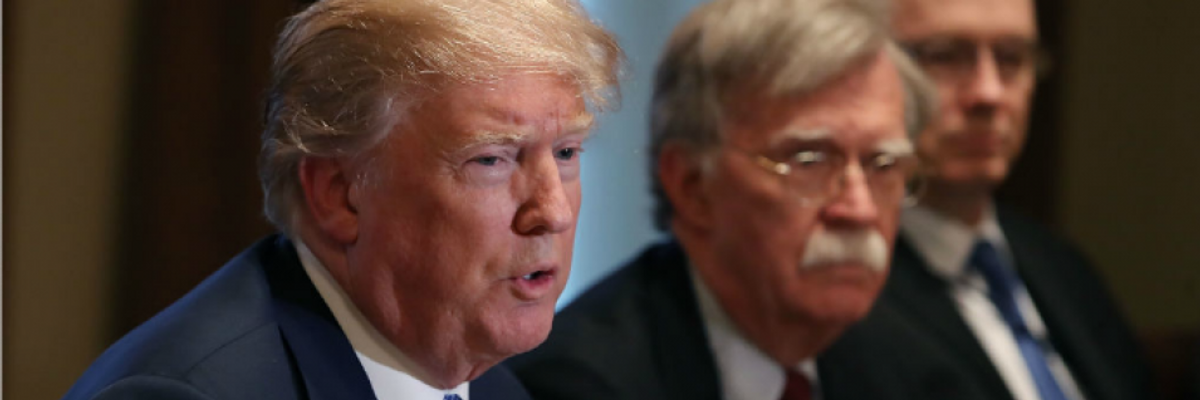The International Atomic Energy Agency (IAEA)--the U.N. nuclear watchdog tasked with vigorously monitoring Iran's nuclear program under the 2015 accord--confirmed this week that Iran exceeded the limit on its supply of low-enriched uranium (LEU). Unfortunately, with a few notable exceptions, reporting from many in the media on this development wasn't great. Reporters and commentators portrayed Iran, not Donald Trump, as the primary provocateur, with many going so far as to claim, without any evidence whatsoever, that Iran is now racing to build a nuclear weapon.
The media has underserved the American public on the recent Trump-induced crisis with Iran. And it's reminiscent of how the mainstream U.S. media handled the Bush administration's march to war in Iraq.
One goal of the Iran nuclear deal (the Joint Comprehensive Plan of Action or JCPOA) was to stretch the timeline to one year in terms of how long it would take Iran to enrich enough uranium for one bomb. To achieve that outcome, the United States, the U.K., France, Germany, China, Russia, and Iran agreed that Tehran could continue enriching uranium for civilian energy purposes but also to cap the amount of LEU it could have on hand at any one time to about 660 pounds. Before the agreement, and ostensibly under the untenable George W. Bush-era policy of "zero enrichment," Iran had amassed around 10,000 pounds of LEU, which if further refined, could be transformed into fuel for nuclear weapons. After the JCPOA's implementation, Iran shipped out 98 percent of its LEU stockpile and verifiably maintained, until this week, the 660-pound cap, even after Trump last year unilaterally reimposed sanctions that were lifted as part of the deal.
And the reason Iran surpassed the cap? Back in May, as part of its unprovoked "maximum pressure" campaign against Iran, the Trump administration revoked sanctions waivers allowing Iran to ship out any excess LEU it produces beyond the 660-pound cap. That left Iran with a choice: bow to Trump's gratuitous demands even though Iran was adhering to the deal or carry on enriching uranium as allowed under the JCPOA.
Iran chose the latter course, in a move that experts say is actually "a calculated effort to get European leaders to reinforce the nuclear deal and halt the drift toward war." Experts also say that breaching the cap, for now, "does not pose a near-term proliferation risk." But that's very far from how some in the U.S. mainstream media portrayed it.
Hours after the news broke, CNN Chief National Security Correspondent Jim Sciutto tweeted that Iran surpassing the 660-pound LEU stockpile limit "appears to be the first violation of the terms of the JCPOA following the U.S. withdrawal from the deal last year." This is completely false. Donald Trump first violated the terms of the JCPOA in November 2018 when he reimposed all economic sanctions on Iran without cause. Trump set this JCPOA-violation crisis in motion, not Iran.
In another example, editors at The New York Times headlined an opinion piece responding to the news: "Iran Is Rushing to Build a Nuclear Weapon--and Trump Can't Stop It."
There is no evidence that Iran is rushing to build a nuclear weapon. In fact, U.S. intelligence has concluded that Iran halted its nuclear weapons program some time between 2002 and 2004.
The text of the Times piece argued, somewhat controversially, that given everything that Iran has endured from the United States, Iran probably should build a nuclear weapon to deter further American right-wing aggression. But the piece never presented any evidence that Iran, based on the latest news of breaching the LEU cap, is dashing toward a bomb. And its author, an American professor of political science at the University of Chicago, isn't involved in the Iranian leadership's decision-making processes. He is stating what he believes Iran should do, not what Iran is actually doing or plans to do.
Similarly, but perhaps less surprisingly, the Wall Street Journal editorial board referred to the news as a "nuclear breakout," a term that is used to describe an actual move toward building nuclear weapons, which of course Iran is not doing.
Perhaps the most egregious reporting on Iran surpassing the LEU cap came in a piece from the seemingly left-leaning news outlet Vox. The original version of the story falsely claimed that Iran "vows to increase enrichment to weapons-grade level by July 7." Although Iran has gotten close, it has actually never enriched uranium to weapons-grade levels, and its leaders have made no such vow. Vox corrected that assertion, but the entire piece, entitled "Why Iran just violated part of the 2015 nuclear deal," never once mentioned the actual reason Iran violated the deal, namely that Trump reimposed sanctions and thereby prevented Iran from shipping out its stockpiled LEU.
These are just a few examples of how the media has underserved the American public on the recent Trump-induced crisis with Iran. And it's reminiscent of how the mainstream U.S. media handled the Bush administration's march to war in Iraq. At that time, the media often relayed false or misleading administration claims at face value with little to no scrutiny and did the White House's bidding by framing the issue on its own aggressive terms, which in turn helped produce public opinion supportive of military action. This same dynamic appears to be at play today.
The truth is that Donald Trump, National Security Advisor John Bolton, and Secretary of State Mike Pompeo are responsible for the current crisis with Iran. They established a policy of confrontation, trashed the nuclear agreement (which is so far working to block Iran from building a bomb), and created the conditions that make another catastrophic war in the Middle East more likely. The U.S. media has to do better at holding them to account. The stakes are too high.

